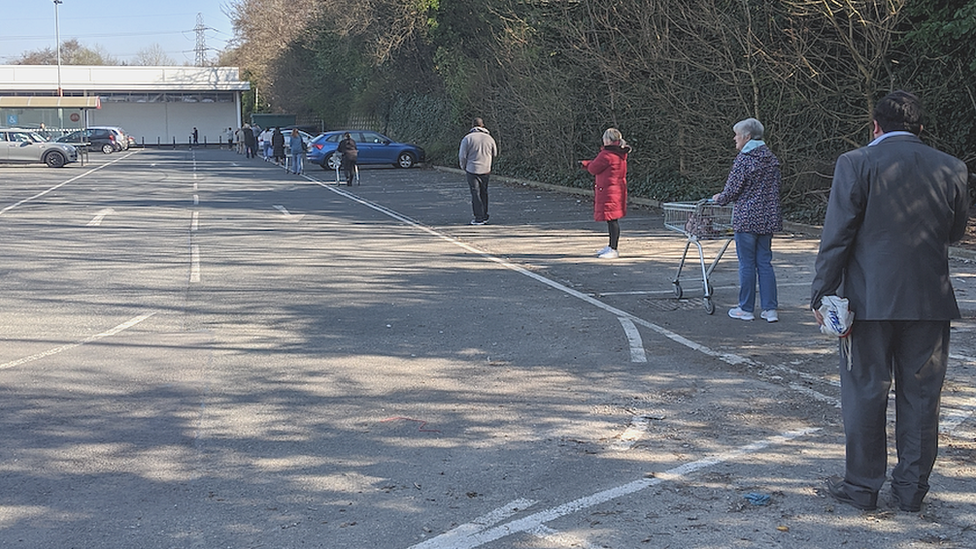Why the standstill will speed everything up
- Published

Are the changes we are seeing to our lives set to last beyond the pandemic?
Future imperfect: Should we be afraid?
Beware journalists who conjure-up an alarming headline and then put a question mark at the end of it. The answer is almost invariably 'No'!
You don't need to have too long a memory to recall the scare stories about the looming "Millennium Bug". The lights would go out, planes would crash from the skies and we'd run out food. Then the year 2000 duly arrived and everything was fine.
So does this "unprecedented pandemic" pose an existential challenge to life as we know it?
See, I've done it again. Except that this time there is something genuinely scary about the known and unknown unknowns that lie ahead.

Not so long ago there were fears about 'Y2K' and the 'millennium bug'
Herefordshire's own Quentin Letts, celebrated Parliamentary sketch writer for "The Times" and theatre critic for "The Sunday Times", suggested recently that he didn't expect much demand after all this is over for any more bleak dystopian dramas set in the near future.
I have news for him. For good or ill, whatever happens in the future is coming our way faster than ever.
We may be at a standstill. But here's the paradox: significant changes to all our lives are being greatly hastened by all this.
Cashless Society
Coinage has been a depreciating asset for some time.
Our canteen staff here at the BBC in Birmingham have been telling me for months, long before this crisis, that customers, especially younger ones, were less and less inclined to splash the cash, preferring instead to flash the card, contactless of course.

Is the cashless society on its way?
During this present crisis, they say it's contactless or nothing. Even I am finding myself more and more prepared to use the card for even the most trivial of purchases no matter whether the outlets are still accepting cash or not.
As this habit catches-on it would surely run against the grain of history for the expression "Cash is King" to make a comeback.
Social Care
For decades, politicians have promised us a proper over-arching discussion across party lines about how social care may be put on a more sustainable footing, freed from its Cinderella status by comparison with healthcare.
And yet, with every general election comes the predictable Punch and Judy act of point-scoring, claim and counter-claim. Bringing the two together into the Department of Health and Social Care may indicate the government's intention to end that silo mentality.
But the dreadful escalation in Covid-related deaths in care homes, where staff reportedly resort to bin bags in the absence of proper protective equipment, presents its own harrowing insight.
While the NHS has the distribution networks it needs to shift supplies to where they are needed fastest, social care is more often provided by an assortment of individual businesses or on behalf of different local authorities.
Politicians of all stripes will discover soon enough that this painful debate can be put off no longer.
And on the subject of ageing communities:
The Conservative Party
The Tories' election victory last December was forged by an unlikely coalition between their traditional voters in affluent suburbs and shire counties on the one hand, and on the other their newfound supporters behind that so-called "Red Wall" in predominantly Brexit-supporting industrial, or post-industrial, areas.
But they did have one important factor in common: Pollsters call it "an ageing demographic".
This already poses serious questions for a party widely ridiculed when membership details emerged suggesting most of their activists were no longer with us.
How long can a party hope to survive when its voters will be among the first to die-off?
Covid-19 means the Tories must have an answer to this question even sooner than they had imagined.
Older voters will discover they are not immune to the tax hikes that will be necessary if the economic damage is to be repaired.
China
Our region's largest carmaker, JLR, is so dependent on its Chinese markets that it has its own production lines there.
Meantime, a planning application for a 5G mast brings the argument over Huawei's involvement ever-closer to my own doorstep.
Leading universities including Birmingham now have their own bases in major Chinese cities and welcome Chinese students to this country as a very lucrative export earner.
There's even talk China could help to speed-up the development of HS2 at less cost.
If our economy is to bounce back as our local and national leaders so fervently hope, then Chinese investment will be at a premium.
And yet, in the same breath, they tell us China must face serious questions about its failure to contain the Coronavirus pandemic and its reluctance to come clean about the threat it poses to the rest of us. Wouldn't it be the ultimate irony if, having given the Coronavirus to the world, China, were then in a stronger position to cement its global economic power?
But I suppose that's just another of those journalistic question marks.
